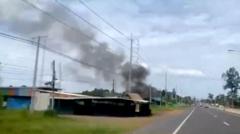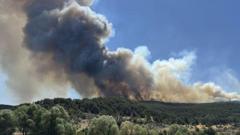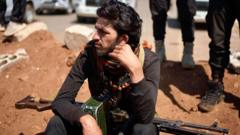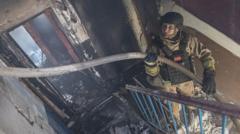Recent military confrontations mark a significant rise in longstanding tensions over territorial disputes.
**Tensions Escalate: Fighting Erupts at Thailand-Cambodia Border**

**Tensions Escalate: Fighting Erupts at Thailand-Cambodia Border**
Dispute between Thailand and Cambodia leads to deadly clashes as both nations accuse each other of aggression.
Fighting erupted along the border between Thailand and Cambodia on Thursday, resulting in the deaths of at least 12 Thai nationals, predominantly civilians, according to Thai authorities. The precise number of casualties on the Cambodian side remains unclear. The conflict intensified following gunfire exchanges, with Thailand accusing Cambodia of launching rocket attacks, prompting Thai airstrikes on Cambodian military positions.
The origins of this border conflict are deeply rooted in history, tracing back over a century to the colonial-era delineation of borders following French occupation in Cambodia. Hostility significantly escalated in 2008 when Cambodia sought to register the 11th-century Temple of Preah Vihear, located in a disputed area, as a UNESCO World Heritage Site, provoking outrage and protests from Thailand. Over the years, sporadic skirmishes have resulted in fatalities on both sides, notably increasing tensions following the death of a Cambodian soldier in May, leading to the lowest level of bilateral relations in over a decade.
Just prior to the recent clashes, both countries had enacted border restrictions; Cambodia suspended imports of Thai fruits and vegetables and halted energy supplies. Troop deployments on both sides of the border have also intensified.
On Thursday, differing accounts of the incidents unfolded. Thailand's National Security Council (NSC) reported that Cambodian military units deployed drones for surveillance leading to an escalation in hostilities. Thai troops attempted to negotiate but faced gunfire from Cambodian forces, which Thailand claimed included heavy weapons causing damage on its side. Conversely, Cambodia accused Thailand of violating agreements and instigating the conflict.
How this conflict progresses remains uncertain. Thai acting Prime Minister Phumtham Wechayachai indicated a desire for a careful resolution that adheres to international law. Cambodian Prime Minister Hun Manet expressed willingness to resolve the issue peacefully while asserting the government's right to defend itself against aggression. Despite previous serious exchanges of fire, analysts suggest that both sides may seek to de-escalate tensions, although current leadership in both countries shows hesitancy in stepping away from confrontation.
Currently, travel advisories remain unchanged, with authorities urging caution for those traveling in border regions, particularly near popular tourist sites. Meanwhile, China has advised its citizens in Cambodia to avoid the Thai border area as the situation continues to develop.
The origins of this border conflict are deeply rooted in history, tracing back over a century to the colonial-era delineation of borders following French occupation in Cambodia. Hostility significantly escalated in 2008 when Cambodia sought to register the 11th-century Temple of Preah Vihear, located in a disputed area, as a UNESCO World Heritage Site, provoking outrage and protests from Thailand. Over the years, sporadic skirmishes have resulted in fatalities on both sides, notably increasing tensions following the death of a Cambodian soldier in May, leading to the lowest level of bilateral relations in over a decade.
Just prior to the recent clashes, both countries had enacted border restrictions; Cambodia suspended imports of Thai fruits and vegetables and halted energy supplies. Troop deployments on both sides of the border have also intensified.
On Thursday, differing accounts of the incidents unfolded. Thailand's National Security Council (NSC) reported that Cambodian military units deployed drones for surveillance leading to an escalation in hostilities. Thai troops attempted to negotiate but faced gunfire from Cambodian forces, which Thailand claimed included heavy weapons causing damage on its side. Conversely, Cambodia accused Thailand of violating agreements and instigating the conflict.
How this conflict progresses remains uncertain. Thai acting Prime Minister Phumtham Wechayachai indicated a desire for a careful resolution that adheres to international law. Cambodian Prime Minister Hun Manet expressed willingness to resolve the issue peacefully while asserting the government's right to defend itself against aggression. Despite previous serious exchanges of fire, analysts suggest that both sides may seek to de-escalate tensions, although current leadership in both countries shows hesitancy in stepping away from confrontation.
Currently, travel advisories remain unchanged, with authorities urging caution for those traveling in border regions, particularly near popular tourist sites. Meanwhile, China has advised its citizens in Cambodia to avoid the Thai border area as the situation continues to develop.




















